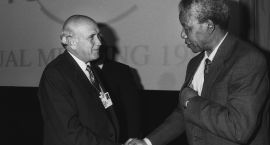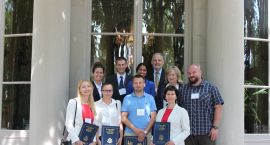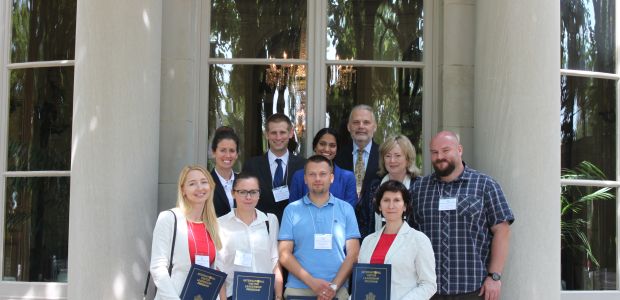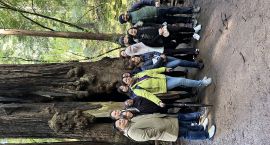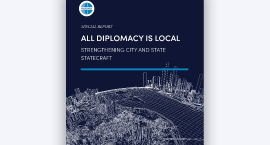A recent IVLP project from Poland, “Educating about Holocaust-related Issues,” exhibited the power of unexpected encounters during exchange programs. Some professional appointments are more predictably impactful than others, but you can never calculate what will happen when strangers meet for the first time. Typically, the conversation ends when the visitors depart for their next meeting, however, one encounter forged an unlikely connection between one former white supremacist and five Polish visitors from the site of one of the world’s most tragic events.
Mr. Arno Michaelis was raised in a middle class Wisconsin community. Michaelis – admittedly an angry, unchallenged, and bored teenager from an emotionally abusive home – fell into the pervasive white power movement for almost a decade as the lead singer of a hate-metal band and founding member of a white racist skinhead organization. This violent period in his life ended when the birth of his daughter caused him to question how his actions were affecting other people and their children. Now as an advocate for anti-bullying programming in schools, he employs his life experience in conversations with Milwaukee youth about acceptance and peaceful conflict resolution.
During their visit to Milwaukee, the Polish group met with Michaelis and Serve 2 Unite, an organization that fosters student leaders who are dedicated to building compassionate communities. After a lead singer in another hate-metal band, fatally shot six people and wounded four others at the Sikh Temple of Wisconsin near Milwaukee, Michaelis joined forces with Mr. Pardeep Kaleka, son of the slain Sikh Temple President, Satwant Singh Kaleka, and Serve 2 Unite. At the meeting, they were also joined by Arts@Large, a Milwaukee organization that implements experiential learning in classrooms through film, photography, theatre, spoken word poetry, fine arts, and dance. The visit became a powerful moment for everyone in the room as Michaelis, Kaleka, the visitors, and others shared stories about their work using education as an agent of change.
Recently, Michaelis travelled to the Auschwitz-Birkenau State Museum to reunite with the Polish visitors just weeks after they first met. Scrolling through his blog,* Michaelis’ states that he was smiling as he arrived to the former concentration camp. The word “smile” evokes immediate skepticism, but he explains:
“A smile is gratitude… when we share that authentic happiness with the world around us, it becomes contagious. [I] once espoused the same hatred that destroyed millions, I understand the antidote to that hate: presence, and love. Hurt people hurt people. Happy people don’t.”
Michaelis spent a significant amount of his life focused on hate, but time and effort was also devoted to his recovery. Sikhism mandates Chardi Kala, or the concept that a Sikh should be optimistic and happy even during the times of adversity. This optimism is not easily attained, but peace takes effort. As humans, we instinctively question the “other” and those who appear differently from what we’re accustomed to. We must make the effort and step outside ourselves for a moment in order to learn from one another and appreciate our differences. Not a task for cowards, according to Michaelis:
“When we find the courage to look at all of our great human family with the love and adoration of kinship—and all the more so when we find new differences to celebrate—the idea of hurting anyone becomes anathema. When we can be confident in the basic goodness of existence, and smile in appreciation, ideologies of fear and separatism have no purchase on who we are.”
This IVLP project included five staff members (Mr. Bartosz Bartyzel, Ms. Marta Bożena Berecka, Ms. Adelina Hetnar-Michaldo, Mr. Tomasz Szymon Michaldo, and Ms. Magdalena Sabina Urbaniak) from the International Center for Education about Auschwitz and the Holocaust at the Auschwitz-Birkenau State Museum in Oświęcim, Poland. They visited the United States for ten days to learn about efforts to educate the public about the Holocaust and human rights issues. The Auschwitz-Birkenau State Museum exists as a memorial to the more than 1,100,000 men, women, and children that lost their lives, and a unique opportunity to visit a completely preserved former concentration camp. The International Center for Education was created in 2005 by the Polish government to support the Museum’s mission and expose the public to new models of education about the Holocaust and the challenges of the modern world.
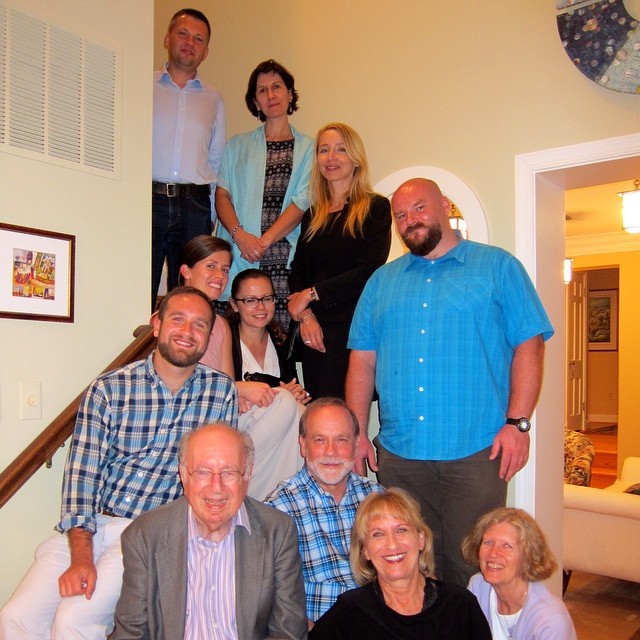
In addition to Milwaukee, where the visitors met Michaelis, the program brought the visitors to New York City and Chicago, and further exposure to best practices in designing educational programs for youth and adults that promote tolerance and mutual understanding. Three program days were also spent in Washington, DC visiting important human rights-related museums, organizations, and institutions, including the United States Holocaust Memorial Museum’s Some Were Neighbors exhibit, which showcased the motives and pressures of the millions of ordinary people who witnessed the crimes of the Holocaust and did nothing to help. Later they heard a thought-provoking overview of modern-day Holocaust education from Rev. Dennis McManus, M.A., D.Litt (Theo), Director of Georgetown’s Jan Karski Institute for Holocaust and Genocide Studies. Rev. McManus stated that the Holocaust will never be repeated, however, the same level of violence is plausible in today’s society due to racial tension, immigration issues, and conflict across the globe. This thought resonated with the visitors; many of the people they are trying to reach in Poland fail to see the link between the horrific acts of the Holocaust and the critical issues surrounding the violence we see in our communities today.
The Polish visitors have returned to their work at Auschwitz-Birkenau and expect a visit from Rev. McManus and his students in the coming months.
*Please note Mr. Michaelis’ blog contains explicit language.









